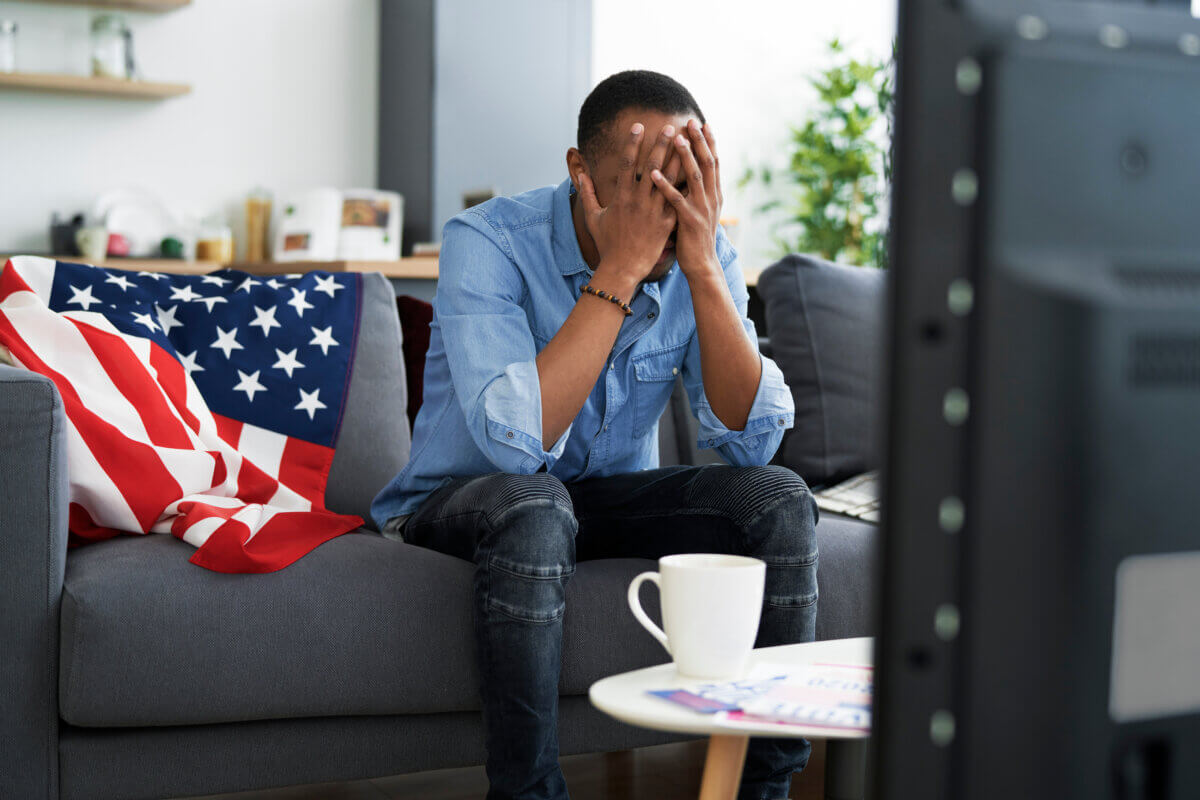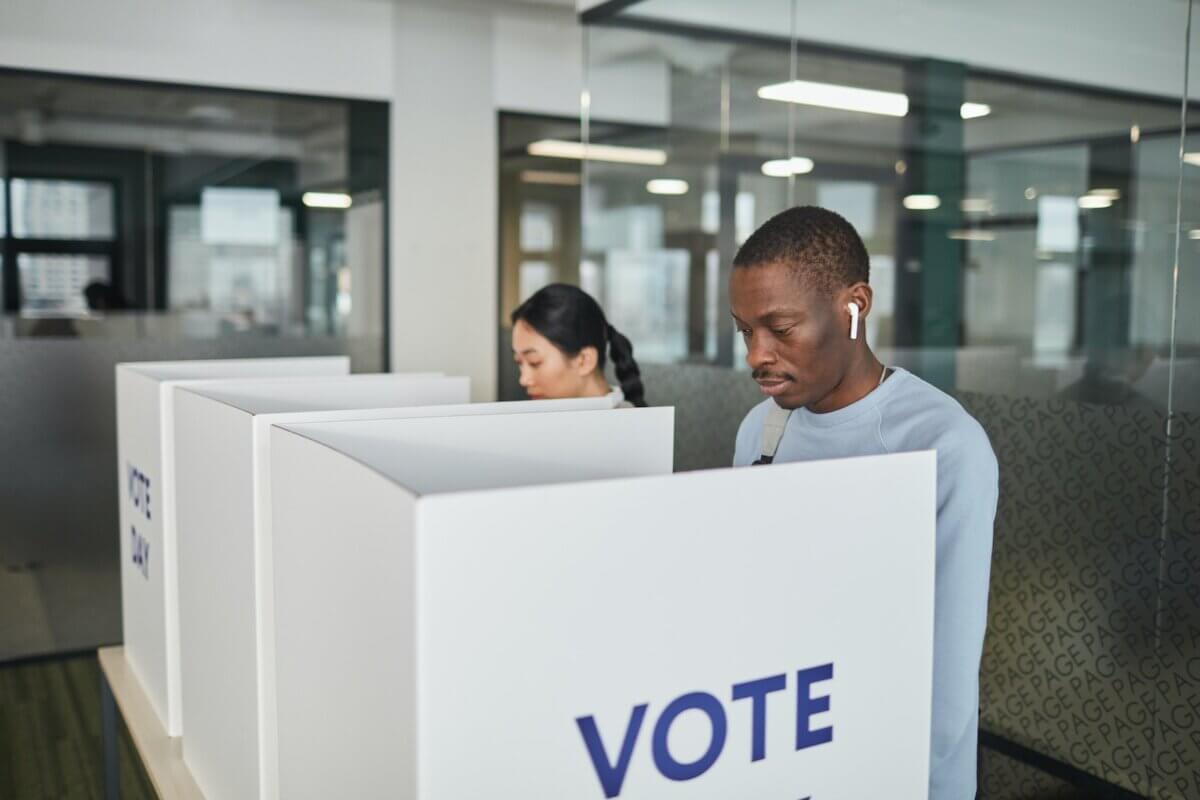

(Credit: gpointstudio/Shutterstock)
NEW YORK — Presidential elections get plenty of people tense, but 2024 may be the most nerve-racking race of them all. More than 60% of Americans in a new poll say that their mental health has either been slightly, moderately, or significantly impacted by November’s election.
In fact, 46% say they have feelings of anxiety, 37% are stressed out, and 31% are experiencing fear when it comes to the 2024 presidential race. Election anxiety is impacting younger Americans in particular, the survey by Forbes Health found.
Specifically, Gen Z (66%), millennials (64%), and Gen X (63%) were most likely to say that the election has had at least a slight negative impact on their mental health, compared to 56% of baby boomers.
Although the survey found the top emotions surrounding the 2024 election are anxiety, stress, and fear, not everyone is having a mental breakdown about the next president. In fact, 27% of participants are feeling optimistic, 22% feel excitement, 16% are happy, and 12% are actually feeling a sense of relief.
Men were more likely to express excitement (27%) than women (19%). Even more men say they have a sense of optimism (32% versus 24%) about the 2024 race. Women were more likely to say they’re experiencing anxiety, stress, and fear.

For some participants, political stress extends beyond the voting booth and impacts their productivity at school and work, according to the survey. When asked how much their performance at work or school has been negatively affected by the upcoming election (for example, due to uncontrollable worry or anxiety), 28% claim their performance has been at least slightly affected in a negative way by the upcoming election.
Gen Z and millennial Americans were most likely to report a drop in their workplace or school performance (53% and 42%, respectively) compared to 24% of Gen X and just 10% of baby boomers.
“I think election day anxiety is a natural response to the significant decisions we are asked to make,” says Rufus Tony Spann, Ph.D., a certified school psychologist, licensed professional counselor, and Forbes Health Advisory Board member, in a statement.
“I believe some people’s anxiety comes from past post-election results,” explains Dr. Spann. “Based on the results of previous elections, some communities felt they needed to prepare for the backlash due to the results of an election.”
“In my opinion, anxiety can manifest in our bodies, decision-making, and emotions,” the psychologist and counselor continues. “One way to know if anxiety is manifesting in our bodies is to be aware of how our bodies react to political decision-making. Does your body become tense, and your breathing become shallow? Although these don’t have to be exact signs, they could be responses to the political situation.”
To cope with election anxiety, 44% of Americans are making efforts to avoid the news, while 35% are talking with friends and family. Another 29% are staying off social media during election season.
In some cases, sharing political views with family or friends doesn’t always guarantee a like-minded audience, and the intensity of debates over conflicting stances has the potential to be heightened during election season. Almost half of respondents (44%) reported feeling more anxious about spending time with family and friends during the upcoming holiday season, with the presidential election occurring just weeks before these major gatherings.
Gen Z had the highest percentage of respondents who feel at least slightly anxious about spending time with family or friends during this year’s holiday season (60%), followed by millennials (54%), Gen X (44%), and baby boomers (28%).

Adding to the anxiety and dread this 2024 election cycle is brewing up is the onslaught of information available on social media, the survey suggests. When asked which platforms overwhelm them the most when it comes to political content, Americans pointed to news publications (26%), YouTube (23%), TikTok (19%), and Instagram (16%) as the biggest culprits.
However, it’s important to note that 40% of respondents felt overwhelmed by none of these platforms. Political content on social media sites may actually be driving away users, with 26% of all respondents reducing their social media usage ahead of the election and 6% ending their social media use entirely.
When asked whether they feel social media helps or hurts the democratic process, 40% of survey participants believe it at least somewhat harms the process, while 29% believe it somewhat helps voters. Gen Z (45%) and millennials (36%) had the highest percentage of respondents who believe social media somewhat helps the democratic process. Baby boomers (51%) and Gen X (41%) were more likely to say that social media harms the democratic process, compared to 33% of millennials and 24% of Gen Z.
“Addressing election anxiety means you can actively participate in having a choice,” adds Dr. Spann. “By taking the steps to register to vote, becoming knowledgeable of the candidates, and voting, you are taking an active stance in this process. This empowerment can help alleviate some of the anxiety.”
Still, if you feel overwhelmed by the election or politics, Dr. Spann notes it’s important to step away from political messaging.
“After getting clarity by relaxing the mind and body, give yourself the space to make a decision you feel comfortable with. Remember, your well-being is crucial, and taking a break from stress can help you make a more informed decision.”
Survey Methodology
This online survey of 2,000 general population U.S. adults was commissioned by Forbes Health and conducted by market research company Talker Research, in accordance with the Market Research Society’s code of conduct. Data was collected from September 4 to September 6, 2024. The margin of error is ± 2.2 points with 95 percent confidence. This survey was overseen by Talker Research, whose team members are members of the Market Research Society (MRS) and the European Society for Opinion and Marketing Research (ESOMAR).

